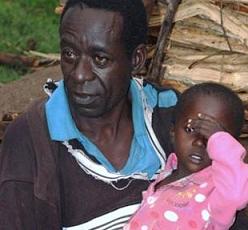In 2007 Bill and Melinda Gates announced that malaria would be banished from the face of the earth by 2015. Medics battling the disease on the ground heard this, shook their heads and said: “One day. But not in our lifetimes.”
Malaria in the 21st century has made Africa its stronghold, and is unlikely to go quietly any time soon.
This ancient disease has haunted us since human history began, and despite the war we've waged against it for hundreds of years, despite our mosquito nets and quinine and drainage of swamps, it's still with us, debilitating 250 million people with fever and claiming a million lives each year.
Of those lives, 90% are in subsaharan Africa.
Malaria has two personas on this continent. The first is how it presents itself to someone like myself: as a dim threat, more an annoyance really, that I need to consider on brief sojourns into the danger zone.
Malaria for those with an escape clause
Earlier this month I visited one of the world's worst malaria hotspots, the Kisumu District near Lake Victoria in western Kenya. There I learnt a new phrase: “holo-endemic malarial area”, a place where the worry of malaria hovers constantly, because it occurs all year round.
But, although I belong to one of the high-risk groups (travellers from malaria-free areas) I hadn't taken any drug prophylaxis prior to the trip. I'd only ever done so once – Larium* in Malawi in 1996, which made me so acutely depressed that I wandered off in despair and got lost in the Mulanji Mountains.
And besides, I was in Kenya for just a few days and sleeping in air-conditioned hotels, after which I'd wing my way back to suburban Cape Town, private hospital cover and our cutely-named “mozzies”, whose presence bodes nothing worse than a restless night and a few itches.
But for the inhabitants of Kisumu with no air ticket to health and safety, the mosquito's thin whine pierces the dusk like a needle.
Living in malaria's own country
Slide show: Malaria, an African story
Maurice Otieno, pictured here with his son Peter, is a subsistence farmer in the lush, garden-like setting of Kit-Mikaye village in rural Kisumu. To reach the mud-walled hut where he lives with his family requires negotiating kilometres of dirt road in a four-wheel drive, and then crossing several green but swampy fields on foot.
He supports his family with subsistence farming, supplemented by selling fish caught in nearby Lake Victoria. This brings in about 100 Kenyan shillings (R8) a day.
Like most adults in the area, he and his wife have survived several bouts of malaria over the course of their lives, acquiring semi-immunity to the disease which affords some protection against life-threatening symptoms. But pregnant women, the elderly, people immunocompromised by HIV infection, and small children especially, are much more vulnerable.
The preventable, treatable, but also easily fatal disease of malaria still kills a child every 45 seconds in Africa.
Maurice's young son, Peter, has had malaria twice already this year. Each time the three-year-old showed symptoms, the family had to debate whether these were bad enough to warrant halting the essential work of food-gathering in order to make the lengthy, expensive trek to the nearest clinic, some 30 km away.
Peter does have a better chance to escape severe malaria than many under- fives: he is now enrolled in a new clinical trial for one of the most promising malaria vaccine studies, and his involvement means he gets largely free medical care and regular visits from health workers.
No magic bullets
Medical scientists are optimistic about a malaria vaccine in a decade or so, but, even if that transpires, malaria experts warn that it's most unlikely to offer an instant, single solution. The battle will continue to be fought as it is now -- with an array of weapons. In rural Africa, especially as global recession shrinks funding from the developed world, costly anti-malaria drugs are not always the answer; other methods must be made to work harder and smarter.
Insecticide-treated bed nets, for example, are still among the cheapest means of reducing malaria's ravages. Veteran malaria researcher Dr Bob Snow calls nets "One of the most effective public health interventions ever - but only if you don't try to make poor people pay for them". Kenya was among the first African nations to supply free nets, with the result that a quarter of children now sleep under them -- with associated drops in infection rates.
Snow also lauds a form of technology that, ten years ago, no one imagined would become a potent third world health tool: the cell phone.
In Kenya, as in many parts of Africa, cell phones are affordable and ubiquitous; even if you don't have one, chances are that in a fix you'll be able to borrow your neighbour's. When parents like Maurice Otieno are worried a child's fever may be dangerous, they can call their community health worker for advice or to arrange a pick-up to the clinic.
Ingenuity and innovation are not confined to high-tech research labs, and the most brilliant cures will fail if they can't prove themselves on the ground. Sometimes, making the most of the resources to hand -- which Africa knows all about doing, in countless ways on a daily basis -- proves simply more workable.
- Story and photos by Olivia Rose-Innes, EnviroHealth Editor, Health24, September 2011 .
*Larium (mefloquine) is in current use for malaria prophylaxis, but it is not recommended for people with psychiatric disorders or heart problems. Depression is a well-known side-effect, and those susceptible should speak to their doctors about alternative drugs.
Slide show: Malaria, an African story
References:
Barrington, J. (2011) The Novartis Malaria Initiative: Innovating to help eliminate malaria (presentation). SMS for Life Programme.
Bhatt, KM. (2011) Current Malaria Situation in Kenya(presentation). University of Nairobi
Snow, Bob. (2011) Malaria Control in Africa (presentation). Kenya Medical Research Institute and University of Oxford.




 Publications
Publications
 Partners
Partners















